Papers written by Hodgkin, Ernest P. (Doctor, b.1908 - d.1998) - Part 11
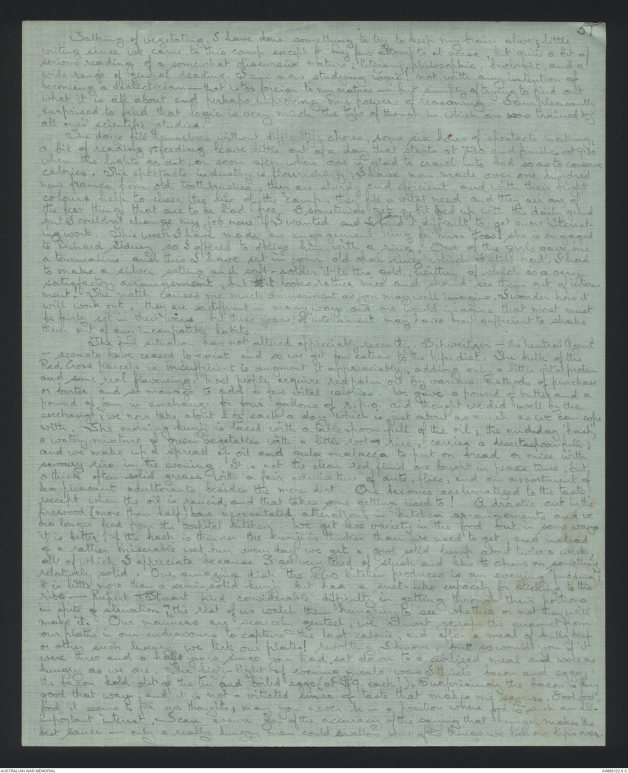
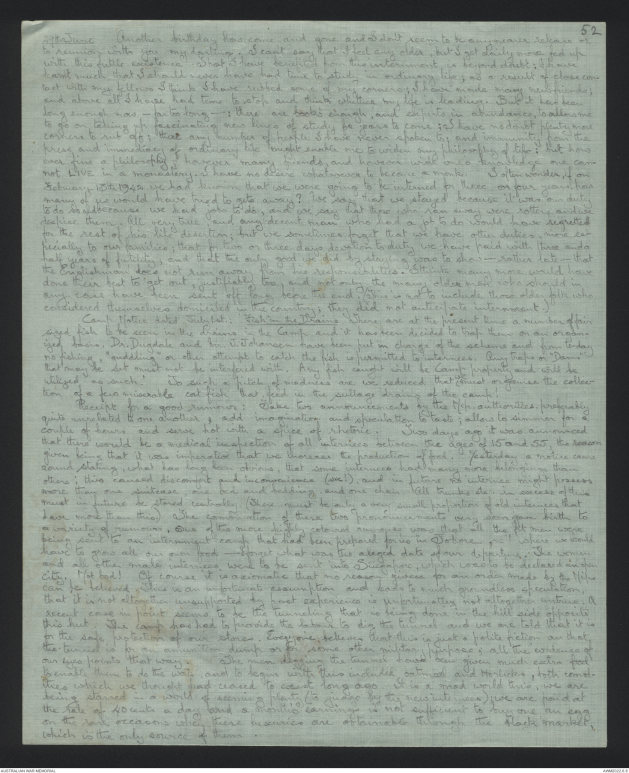
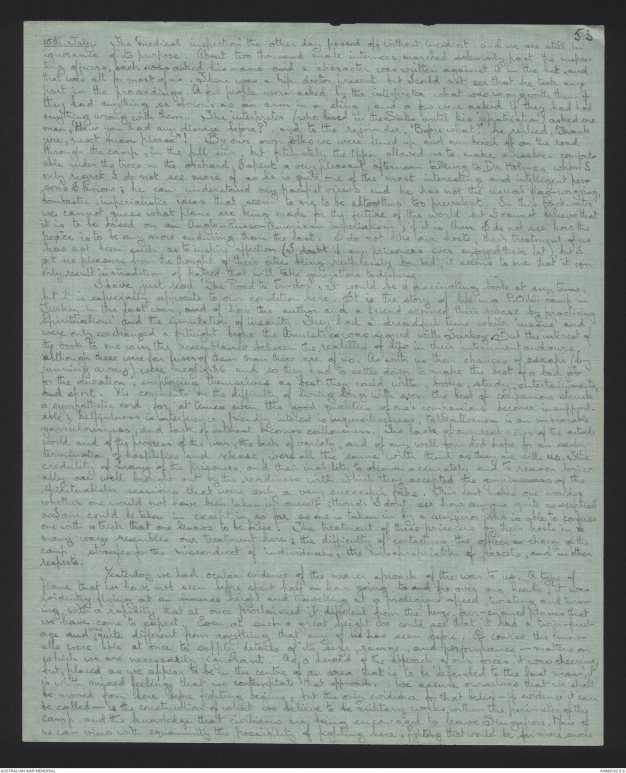
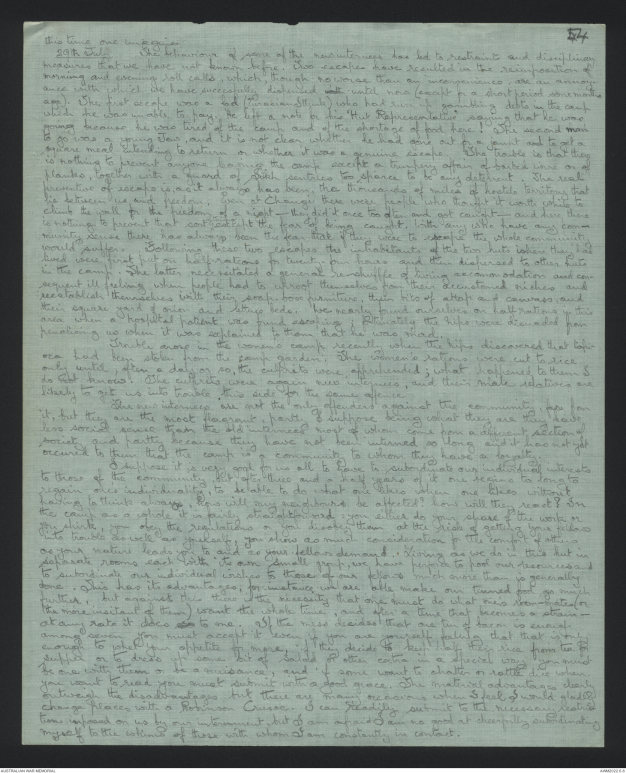
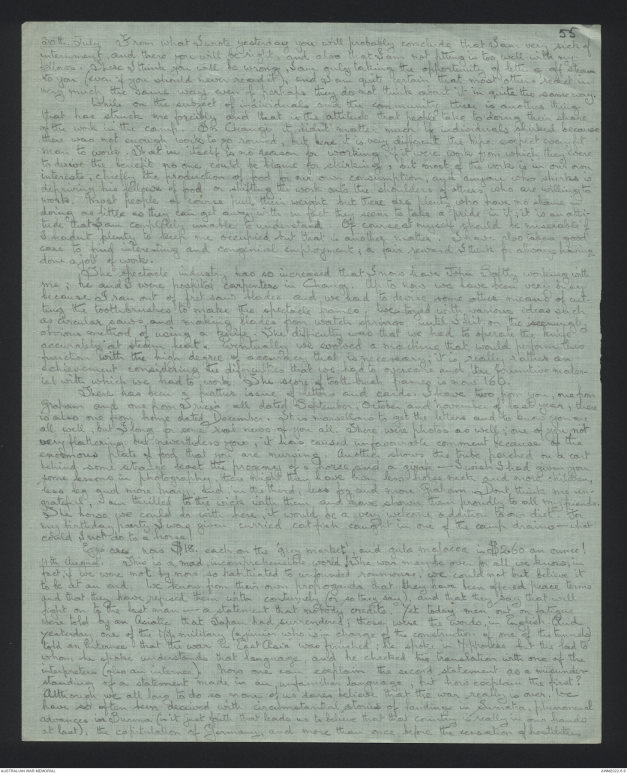
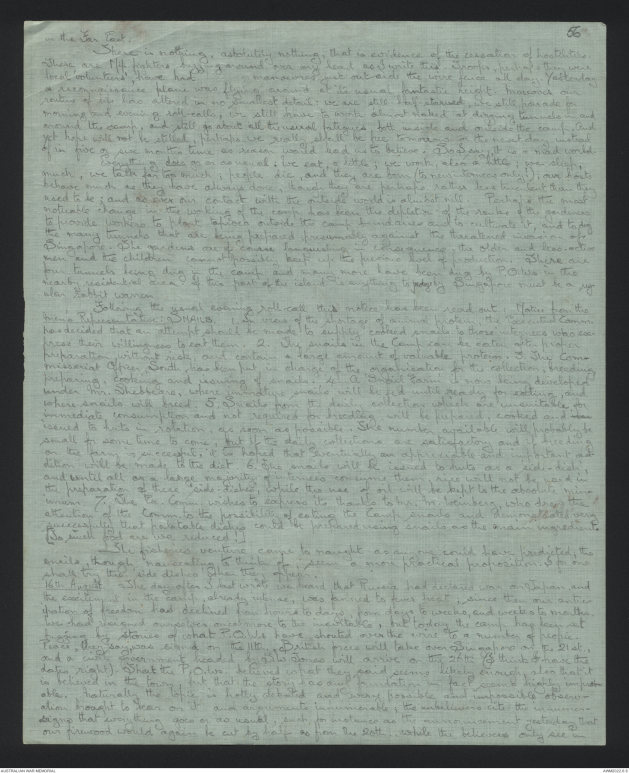
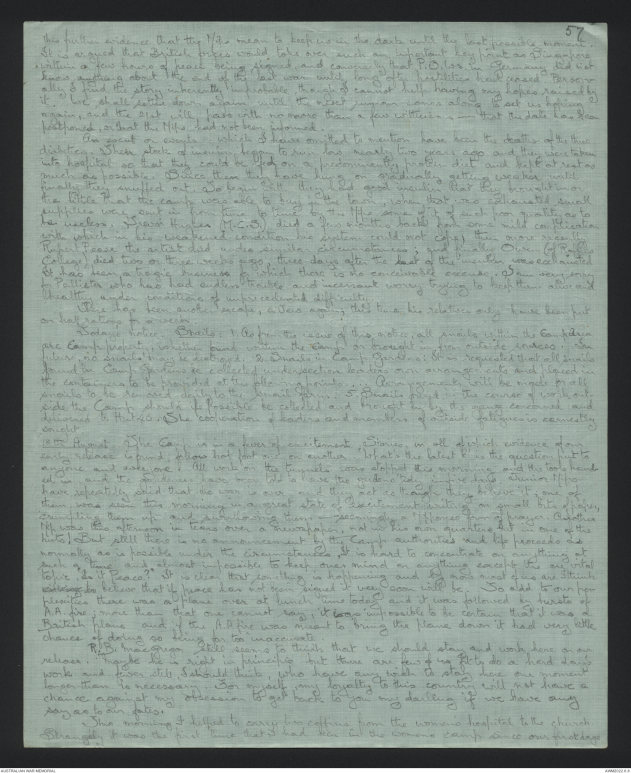
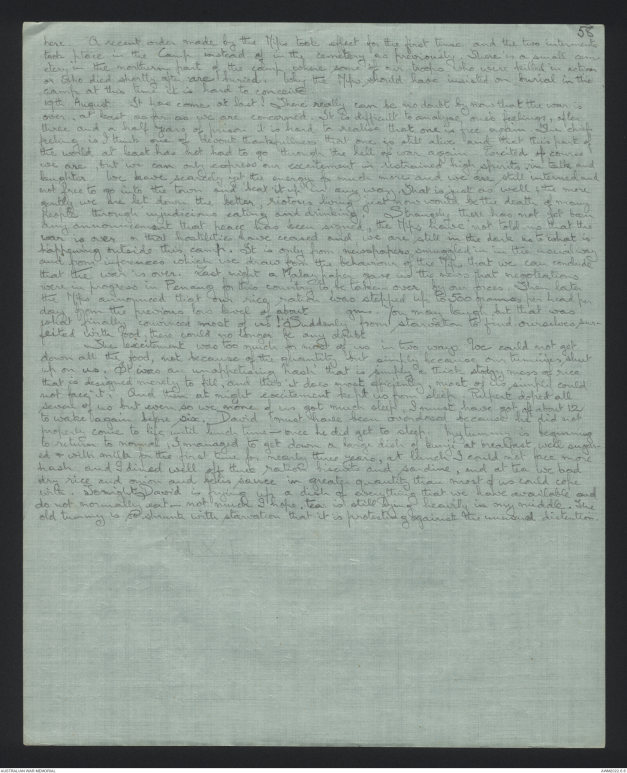
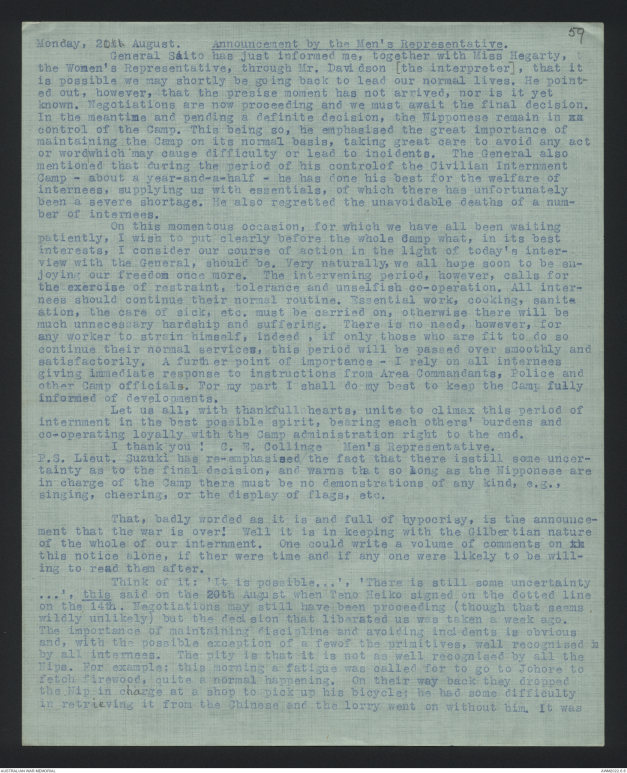
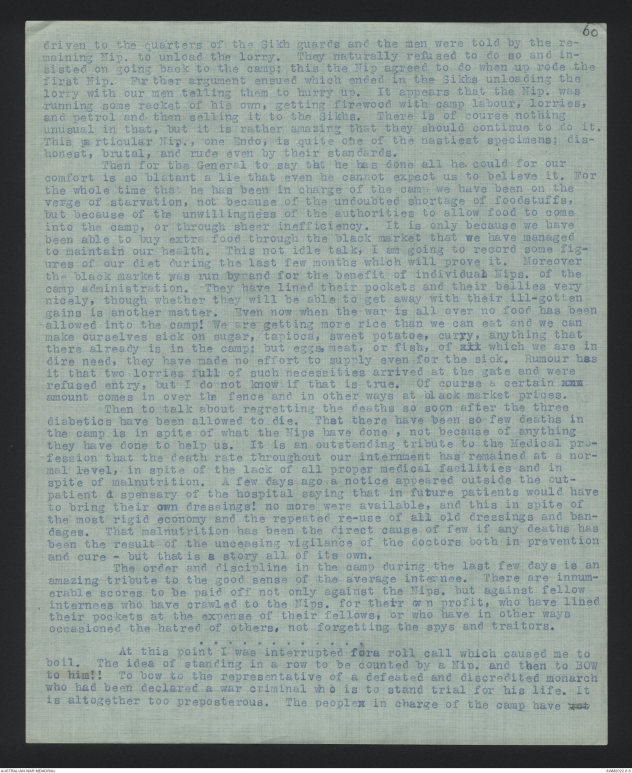
51
Talking of vegetating. I have done something to try to keep my brain alive; little writing since we came to this camp except for my few attempts at verse, but quite a bit of serious reading of a somewhat discursive nature; literary, philosophic, biologic, and a wide range of general reading & am now studying Logic! not with any intention of
becoming a dialectician - that is too foreign to my nature - but simply of trying to find out
what it is all about and perhaps improving my powers of reasoning. I am pleasantly
surprised to find that logic is very much the type of thought in which one was trained by
all one's scientific studies.
The days fill themselves without difficulty: chores, some six hours of spectacle making,
a bit of reading & feeding leave little out of a day that starts at 7.30 and finishes at 9.30
when the lights go out, or soon after when one is glad to crawl into bed so as to conserve
calories. The spectacle industry is flourishing; I have now made over one hundred
new frames from old toothbrushes, they are sturdy and efficient, and with their bright
colours help to cheer the life of the camp. they fill a vital need and they are one of
the few things that are to be had free, I sometimes get a bit fed up with the daily grind
but I couldn't change my job now if I wanted and I find it difficult to get more interesting
work. This week I have made an engagement ring for Miss Jones! she is engaged
to Richard Sidney so I offered to oblige him with a ring. One of the girls gave me
a tourmaline and this I have set in your old opal ring which I still had. I had
to make a silver setting and soft-solder it to the gold, neither of which is a very
satisfactory arrangement, but xx it looks rather nice and should see them out of internment!
The match causes one much amusement as you may well imagine. I wonder how it
will work out, they are so different in many ways and one would imagine that most must
be fairly set in their ways, but three years of internment may have been sufficient to shake
them out of any incompatible habits.
The food situation has not altered appreciably recently. Schweitzer- the 'Neutral Agent'
seems to have ceased to exist and so we get few extras to the Nip. diet. The bulk of the
Red Cross parcels is insufficient to augment it appreciably, adding only a little vital protein
and some real flavouring. Most people acquire red palm oil by various methods of purchase
or barter and so manage to add a few vital calories. We gave a pound of butter and a
pound of jam in exchange for four gallons of r.p.o. and thought we did well by the
exchange, we now take about 8 oz each a day which is just about as much as we can cope
with. The morning kunji is laced with a tablespoon full of the oil; the midday 'hash',
a watery mixture of mean vegetables with a little root x rice, carries a
desert-spoonfull;
and we make up a spread of oil and gula malacca to put on bread or mix with
savoury rice in the evening. It is not the clear red fluid one bought in peace time, but
a thick often solid grease with a fair admixture of ants, flies, and an assortment of
less pleasant adulterants besides the mere dirt. One becomes acclimatized to the taste,
except when the oil is rancid, and that takes some getting used to! A drastic cut in the
firewood (more than half) has necessitated alterations in kitchen arrangements and we
no longer feed from the Hospital kitchen. We get less variety in the food but in some ways
it is better; if the hash is thinner the kunji is thicker than we used to get, and instead
of a rather miserable wet bun every day we get a good solid lump about twice a week,
all of which I appreciate because I get very tired of slush and like to chew on something
relatively solid. One amazing dish the new kitchen produced is an evening pudding;
It is little more than a semi-solid kunzi but has a suet-like capacity for sticking to the
ribs - Rupert & Stuart find considerable difficulty in getting through their portions
in spite of starvation so the rest of us watch them hungrily to see whether or not they will
make it. Our manners are scarcely genteel, we almost scrape the enamel from
our plates in our endeavours to capture the last calorie, and after a meal of bully beef
or other such luxury we lick our plates! revolting I know, but so would you if it
were three and a half years since you had sat down to a civilized meal and were as
hungry as we are. The high-light of evening meals was I think bacon and eggs;
the bacon [[bold?]]out of the tin and boiled eggs (at $9 each!). Surprisingly the bacon is very
good that way and it is not a vitiated sense of taste that makes me say so. Food, food,
food, it seems to fill our thoughts, may you never be in a position where food is such an all
important interest. I can assure you of the accuracy of the saying that hunger makes the
best sauce - only a really hungry man could swallow some of the things we lick our lips over.
52
29th June Another birthday has come and gone and I don't seem to be any nearer release or
to reunion with you my darling. I can't say that I feel any older, but I get daily more fed up
with this futile existence. That I have benefited from this internment is beyond doubt; I have
learnt much that I should never have had time to study in ordinary life; as a result of close contact
with my fellows I think I have rubbed some of my corners; I have made many friends;
and above all I have had time to stop and think whither my life is leading. But it has been
long enough now - far too long - : there are books enough, and experts in abundance, to allow me
to go on taking up fascinating new lines of study for years to come; I have no doubt plenty more
corners to rub off; that any number of people I have never spoken to; and immunity from the
press and immediacy of ordinary life might enable me to widen my philosophy of life; but how
ever fine a philosophy, however many friends, and however wide one's knowledge one can
not LIVE in a monastery. I have no desire whatsoever to become a monk. I often wonder, if on
February 13th 1942, we had known that we were going to be interned for three or four years, how
many of us would have tried to get away? We say that we stayed because it was our duty
to do so and because we had jobs to do, and we say that those who ran away were rotten and we
despise them. All were true, and any decent man who had a job to do would have regretted
for the rest of his life desertion; but we sometimes forget that we have other duties, more especially
to our families; that for two or three days devotion to duty we have paid with three and a
half years of futility, and that the only good we did by staying was to show - rather late - that
the Englishman does not run away from his responsibilities. I think many more would have
done their best to get out, justifiably too, and not only the many older men who should in
any case have been sent off long before the end. (This is not to include those older folk who
considered themselves domiciled in the country; they did not anticipate internment.)
Camp Notice dated July 1st. 'Fish in the Drains Where at the present time a number of fair
sized fish to be seen in the drains in the Camp and it has been decided to trap them on an organized
basis. Dr. Dugdale and Mr. W. Johansen have been put in charge of the scheme and from today
no fishing, "guddling" or other attempts to catch fish is permitted to internees. Any traps
or "Dams"
that may be set must not be interfered with. Any fish caught will be Camp property and will be
utilized as such.' To such a pitch of madness are we reduced that ^ we must organise the collection
of a few miserable cat fish that feed in the sewage drains of the camp!
Receipt for a good rumour: Take two announcements by the Nip. authorities, preferably
quite unrelated to one another, add imagination and speculation to taste; allow to simmer for a
couple of hours and serve hot with a spice of rhetoric. Two days ago it was announced
that there would be a medical inspection of all internees between the ages of 15 and 55, the reason
given being that it was imperative that we increase the production of food. Yesterday a notice came
round stating, what has long been obvious, that some internees had many more belongings than
others; this caused discomfort and inconvenience (sic!), and in future no internee might possess
more than one suitcase, one bed and bedding and one chair. All trunks etc in excess of these
must in future be stored centrally. (There must be only a very small proportion of old internees that
have more than this.) The combination of these two pronouncements very soon gave birth to
a variety of rumours. One or the more highly coloured rumours was that all the fit men were
being sent to an internment camp that had been prepared for us in Johore, where we would
have to grow all our own food - I forget what was the aleged date of our departure. The women
and all other male internees were to be sent into Singapore, which was to be declared in [[?]]
city. Not bad! Of course it is axiomatic that no reason given for an order made by the Nips
can be believed. There is an unfortunate assumption and leads to much groundless speculation,
that it is not altogether unsupported by past experience is unfortunately not altogether untrue. A
recent case in point seems to be the tunneling that is being done in the hill side opposite
this hut. The camp has had to provide the labour to dig the tunnel and we are told that it is
for the safe protection of our stores. Everyone believes that this is just a polite fiction or that
the tunnel is for an ammunition dump or for some other military purpose; all the evidence of
our eyes points that way. The men digging the tunnel have been given much extra food
to enable them to do the work, and to begin with this included oatmeal and Horlicks, both comodities
which we thought had ceased to exist long ago. It is a mad world this. we are
being starved in a world of seeming plenty (to judge by the new internees), we are paid at
the rate of 40 cents a day and a month's earnings is not sufficient to buy one an egg
on the rare occasions when these luxuries are obtained through the black market,
which is the only source of them.
53
15th. July. The medical inspection the other day passed off without incident and we are still in
ignorance of its purpose. About two thousand male internees marched solemnly past the inspecting
officers, each was asked his name and a character was written against it in the hut, and
that was all for most of us. There was a Nip. doctor present but I could not see that he took any
part in the proceedings. A few people were asked by the interpreter what was wrong with them if
they had anything so obvious as an arm in a sling, and a few were asked if they had had
anything wrong with them. The interpreter (who lived in the States until his repatriation) asked one
man, 'Have you had any disease before?' and to the rejoinder, 'Before what?' he replied, Thank
you, next man please'! By our own folks we were lined up and numbered off on the road
through the camp, in the full sun, but fortunately the Nips. allowed us to make ourselves comfortable
under the trees in the orchard. I spent a very pleasant afternoon talking to Dr Holmes whom I
only regret I do not see more of as he is quite one of the most interesting and intelligent persons I know; he can understand my pacifist views and he has not the usual flag-wagging
bombastic, imperialistic ideas that seem to me to be altogether too prevalent. In this backwater
we cannot guess what plans are being made for the future of the world but I cannot believe that
it is to be based on an Anglo-Russian-American Imperialism; if it is then I do not see how the
peace is to be any more enduring than the last. I do not like our hosts, their treatment of us
has not been such as to inspire affection (I doubt if any prisoners ever enjoyed their lot), but I
get no pleasure from the thought of their cities being ruthlessly bombed, it seems to me that it can
only result in a tradition of hatred that will take generations to disperse.
I have just read 'The Road to En-dor'. It would be a fascinating book at any time,
but it is especially apposite to our condition here. It is the story of life in a P.O.W. camp in
Turkey in the last war, and of how the author and a friend secured their release by practising
Spiritualism and the simulation of insanity. They had a dreadful time while 'insane' and
were only exchanged a fortnight before the Armistice was signed with Turkey. But the interest of
the book to me is in the resemblance between the realities of life in their internment and ours,
although there were far fewer of them than there are of us. As with us their chances of escape (by
running away) were negligible and so they had to settle down to make the best of a bad job
for the duration, employing themselves as best they could with books, study, entertainments,
and sport. His comments on the difficulty of living long with even the best of companions struck
a sympathetic cord, for at times even the good qualities of one's companions become insupportable; helpfulness is interference. friendly interest is inquisitiveness, talkativeness is an unbearable
garrulousness, and lack of interest becomes callousness. The lack of any real news of the outside
world and of the progress of the war, the lack of variety, and of any well founded hope for an early
termination of hostilities and release, was all the same with them as they are with us. The
credulity of many of the prisoners and their inability to observe accurately and to reason logically are well brought out by the readiness with which they accepted the genuineness of the
Spiritualistic sessions that were only a very successful fake. This last makes one wonder
whether one would not have been taken in oneself; though I dont see how anyone quite as sceptical
as I am could be taken in except in as far as one is taken in by a cunjuror who is able to confuse
one with a trick that one knows to be false! The treatment of these prisoners by their hosts in m
many ways resembles our treatment here: the difficulty of contacting the officer in charge of the
camp, [[stran?]] for the misconduct of individuals, the misapropriation of parcels, and in other
respects.
Yesterday we had ocular evidence of the nearer aproach of the war to us. A type of
plane that we have not seen before spent half an hour going to and fro over our heads; it was
evidently flying at an immense height and travelling at a prodigious speed, twisting and turning
with a rapidity that at once proclaimed it different from the huge four-engined planes that
we have come to expect. Even at such a great height we could see that it had a twin-fuselage
and ^ was quite different from anything that any of us have seen before. Of course, the [[?]]
were able at once to supply details of its size, range, and performance - matters on
which we are necessarily ignorant. As a herald of the approach of our forces it was cheering,
but, placed as we appear to be in the centre of an area that is to be 'defended to the last man', it
is with mixed feelings that we contemplate that approach. We assure ourselves that we shall
be moved from here before fighting begins, but the only evidence for that belief - if evidence it can
be called - is the construction of what we believe to be military works within the perimeter of the
camp, and the knowledge that civilians are being encouraged to leave Singapore. None of
us can view with equanimity the possibility of fighting here, fighting that would be far more severe
54
this time one imagines.
29th July The behaviour of some of the new internees has led to restraints and disciplinary
measures that we have not known before. Two escapes have resulted in the reimposition of
morning and evening roll calls, which, though no worse than an annoyance
with which we have succesfully dispensed with until now (except for a short period some months
ago). The first escape was a lad (Eurasian I think) who had run up gambling debts in the camp
which he was unable to pay. He left a note for his 'Hut Representative' saying that he was
going because he was tired of the camp and of the shortage of food here! The second man
to go was a young Jew, and it is not clear whether he had gone out for a jaunt and to get a
square meal intending to return or whether it was a genuine escape. The trouble is that there
is nothing to prevent anyone leaving the camp except a [[trumpery?]] affair of barbed wire or of
planks, together with a guard of Sikh sentries too sparse to be any deterrent. The real
preventive of escape is, as it always has been, the thousands of miles of hostile territory that
lie between us and freedom. Even at Changi there were people who thought it worth while to
climb the wall for the freedom of a night - they did it once too often and got caught - and here there
is nothing to prevent that sort ^of thing except the fear of being caught. With any who have any community
sense there has always been the fear that if they were to escape the whole community
would suffer. Following these two escapes the inhabitants of the two huts where they had
lived were first put on half-rations for twenty-four hours and then dispersed to other huts
in the camp. The latter necessitated a general re-shuffle of living accommodation and consequent
ill feeling when people had to uproot themselves from their accustomed niches and
reestablish themselves with their soap-box furniture, their bits of attap and canvass, and
their square yard of onion and lettuce beds. We nearly found ourselves on half rations in this
area when a hospital patient was found escaping; fortunately the Nips were disuaded from
penalising us when it was explained to them that he was mad.
Trouble arose in the women's camp recently when the Nips discovered that tapioca
had been stolen from the camp garden. The women's rations were cut to rice
only until, after a day or so, the culprits were apprehended; what happened to them I
do not know. The culprits were again new internees, and their male relatives are
likely to get us into trouble this side for the same offence.
The new internees are not the only offenders against the community, far from
it, but they are the most flagrant, partly I suppose being what they are they have
less social sense than the old internees most of whom come from a different section of
society and partly because they have not been interned so long and it has not yet
occured to them that the camp is a community to whom they have a loyalty.
I suppose it is very good for us all to have to subordinate our individual interests
to those of the community, but after three and a half years of it one begins to long to
regain one's individuality, to be able to do what one likes when one likes without
having to think always, how will my neighbours be affected? how will they react? In
the camp as a whole it is fairly straightforward - you either do your share of the work or
you shirk, you obey the regulations or you disobey them at the risk of getting your fellows
into trouble as well as yourself, you show as much consideration for the comfort of others
as your nature leads you to and as your fellows demand. Living as we do in this hut in
separate rooms each with its own small group, we have perforce to pool our resources and
to subordinate our individual wishes to those of our fellow much more that is generally
done. This has its advantages, for instance, we are able make our tinned food go much
further, but against this there is the necessity that one must do what one's room-mates (or
the more insitant of them) want the whole time, and after a time that becomes a strain -
at any rate it does so to me. If the mess decides that one tine of bacon is enough
among seven you must accept it even if you are
yourself feeling that that is only
enough to whet your appetite for more, if they decide to keep half their rice from tea for
supper or to dress up some bit of salad or other extra in a special way you must
be one with them or be a nuisance, and if some want to chatter or rattle dice when
you want to read you must submit with a good grace. The material advantages clearly
outweigh the disadvantages but there are many occasions when I feel I would gladly
change places with a Robinson Crusoe. I can readily submit to the necessary restrictions
imposed on us by our internment, but I am afraid I am no good at cheerfully subordinating
myself to the whims of those with whom I am
constantly in contact.
55
20th July From what I wrote yesterday you will probably conclude that I am very sick of
internment, and there you will be right, and also that I am not fitting in too well with my
fellows. There I think you will be wrong, I am only taking the opportunity of letting off steam
to you (even if you should never read it), and I am quite certain that most others react in
very much the same way even if perhaps they do not think about it in quite the same way.
While on the subject of individuals and the community there is another thing
that has struck me forcibly and that is the attitude that people take to doing their share
of the work in the camp. In Changi it didn't matter much if individuals shirked because
there was not enough work to go round, but here it is very different The Nips expect every fit
man to work. That in itself is no reason for working, if it were work from which they were
to derive the benefit no one could be blame for shirking, but most of the work is in our own
interests, chiefly the production of food for our own consumption, and anyone who shirks is
depriving his fellows of food or shifting the work onto the shoulders of others who are willing to
work. Most people of course pull their weight but there are plenty who have no shame in
doing as little as they can get away with in fact they seem to take a pride in it; it is an attitude
that I am completely unable to understand. Of course at myself should be miserable if
I hadn't plenty to keep me occupied but that is another matter. I have also taken good
care to find interesting and congenial employment, a fair reward I think for always having
done a job of work.
The spectacle industry has so increased that I now have John Softly, working with
me; he and I were hospital carpenters in Changi. Up to now we have been very busy
because I ran out of fret saw blades and we had to devise some other means of cutting
the toothbrushes to make the spectacle frames. We toyed with various ideas such
as circular saws and making blades from watch springs, until I hit on the seemingly
obvious method of using a knife. The difficulty was that we had to operate the knife
accurately at steam heat. Eventually we evolved a machine that would perform this
function with the high degree of accuracy that is necessary; it is really rather an
achievement considering the difficulties that we had to overcome and the primitive material
with which we had to work. The score of toothbrush frames is now 160.
There has been a [[?ttier?]] issue of letters and cards. I have two from you, one from
Graham and one from Tricia all dated September, October and November of last year; there
is also one from home dated December. It is marvellous to get the letters and to know you are
all well, but I long for some [[real?]] news of you all. There were photos as well; one of you not
very flattering but nevertheless you, it has caused unfavourable comment because of the
enormous plate of food that you are nursing. Another shows the tribe perched on a cart
behind some strange beast the progeny of a horse and a giraffe - I wish I had given you
some lessons in photography, there might then have been less horse neck and more children,
less leg and more Mary, and in the third, less fog and more Graham. Dont think me ungrateful,
I am thrilled to the wick with them, and have shown them proudly to all my friends.
The horse we could do with here, it would be a very welcome addition to our diet. For
my birthday party, I was given curried catfish caught in one of the camp drains - what
could I not do to a horse!
Eggs are now $18. each on the 'grey market' and malacca is $2.60 an ounce!
4th August. This is a mad incomprehensible world! The war may be over for all we know, in
fact if we were not by now so habituated to unfounded roumours, we could not but believe it
to be at an end. We know from their own propoganda that they have been offered peace terms
and that they have refused them with [[conti?ly?]] (or so they say), and that they say that they will
fight on to the last man in a statement that nobody credits. Yet today men out on fatigue
were told by an Asiatic that Japan had surrendered; those were the words in English. And
yesterday one of the Nip military (a junior who is in charge of the construction of one of the tunnels)
told an internee that the war in 'East Asia' was finished; he spoke in Nippolise but the lad to
whom he spoke understand that language, and he checked his translation with one of the
interpreters (also an internee). Now one can explain the second statement as a misunderstanding
of a statement made in an unfamiliar language, but how explain the first?
Although we all long to do so none of us dares believe that the war really is over. We
have so often been deceived with circumstantial stories of landings in Sumatra, [[phenomenal?]]
advance in Burma (is it just faith that leads us to believe that that country is really in our hands
at last). the capitulation of Germany, and more than once before the cessation of hostilities
56
in the Far East.
There is nothing, absolutely nothing, that is evidence of the cessation of hostilities.
There are Nip fighters buzzing around over my head as I write this. Troops, part of them were
local 'volunteers', have had manouvres just outside the wire fence all day. Yesterday
a reconnaissance plane was flying around at its usual fantastic height. Moreover our
routine of life has altered in no smallest detail: we are still half-starved, we still parade for
morning and evening roll-calls, we still have to work almost naked at digging tunnels in and
around the camp, and still go about all the usual fatigues, both inside and outside the camp. And
yet hope will not be stilled, perhaps we really shall be free tomorrow or the next day instead
of in five or six months time as reason would lead us to believe. [[Ho Hum?]], it is a mad world.
Everything does go on as usual. We eat, a little; we sleep,
much, we talk far too much; people die, and they are born (to new internees only!), our hosts
behave much as they have always done, though they are perhaps rather less lenient than they
used to be; and so even our contact with the outside world is almost nill. Perhaps the most
noticeable change in the working of the camp has been the depletion of the ranks of the gardeners
to provide workers to plant tapioca outside the camp boundaries and to cultivate it, and to dig
the many tunnels that are being prepared presumably against the threatened invasion of
Singapore. The gardens are of course languishing in consequence, the older and less-active
men and the children cannot possibly keep up the previous level of production. There are
four tunnels being dug in the camp and many more have been dug by P.O.Ws in the
nearby residential area if this part of the island is anything to judge by Singapore must be a regular
rabbit warren.
Following the usual evening roll-call this notice has been read out: Notice from the
Men's Representative: SNAILS. 1. In view of the shortage of animal protein, the Executive Comm.
has decided that an attempt should be made to supply cooked snails to those internees who express
their willingness to eat them. 2. The snails in the Camp can be eaten after proper
preparation without risk, and contain a large amount of valuable protein. 3. The Commisseriat
Officer, South, has been put in charge of the organisation for the collection, breeding,
preparing, cooking and issuing of snails. 4. A 'Snail Farm' is now being developed
under Mr. Shebbeare, where immature snails will be fed until ready for eating, and
where snails will breed. 5. Snails from the daily collection which are unsuitable for
immediate consumption and not required for breeding will be prepared, cooked and iss
issued to huts in rotation, as soon as possible. The number available will probably be
small for some time to come, but if the daily collections are satisfactory and if breeding
on the farm is successful, it is hoped that eventually an appreciable and important addition
will be made to the diet. 6. The snails will be issued to huts as a 'side-dish',
and until all or a large majority of internees consume them, rice will not be used in
the preparation of these 'side-dishes', while the use of oil will be kept to the absolute minimum.
7. The Ex. Comm. wishes to express its thanks to Mr. M Weinberg, who drew the
attention of the Comm. to the possibility of eating the Camp snails and demonstrated very
successfully that palatable dishes could be prepared using snails as the main ingredient.
[To such food are we reduced!]
The fisheries venture came to naught as anyone could have predicted, the
snails, though nauseating to think of, seem a more practical proposition. I for one
shall try the 'side-dishes' when they appear.
16th August The day after I last wrote we heard that Russia had declared war on Japan, and
the excitement in the camp, already intense, was fanned to fever heat since then our anticipation
of freedom had declined from hours to days, from days to weeks, and weeks to months.
We had resigned ourselves once more to the inevitable, but today the camp has been set
buzzing by stories of what P.O.W's have shouted over the wire to a number of people.
Peace, they say, was signed on the 11th.,British forces will take over Singapore on the 21st.,
and a unity Government headed by [[?]] Jones will arrive on the 26th. (I think I have the
dates right.) That the P.OWs believed what they said seems likely enough, also that it
is believed in the town, but that the story has any foundation in fact seems highly improbable.
Naturally the topic is hotly debated and every possible and impossible observation
brought to bear on it and arguments innumerable; the unbelievers cite the [?] -
signs that everything goes on as usual, such, for instance, as the announcement yesterday that
our firewood would again be cut by half as from the 20th. while the believers only see in
57
this further evidence that the Nips mean to keep us in the dark until the last possible moment.
It is argued that British forces would take over such an important key point as Singapore
within a few hours of peace being signed and conversely that P.O.Ws in Germany did not
know anything about the end of the last war until long after hostilities had ceased. Personally
I find the story inherently improbable, though I cannot help having my hopes raised by
it. Weshall settle down again until the next rumour comes along to set us hoping
again, and the 21st will pass with no more that a few [[witticisms?]] - that the date has been
postponed, or that the Nips had not been informed.
An [[?]] on events which I have omitted to mention have been the deaths of the three
diabetics. Their stock of insulin began to run low nearly two years ago and they were taken
into hospital so that they could be fed on a predominantly protein diet and kept at rest as
much as possible. Since then they have hung on gradually getting weaker until
finally they snuffed out. To begin with they had good insulin that they brought in or
the little that the camp was able to buy in the town, when that was exhausted small
supplies were sent in from time to time by the Nipps, some of it of such poor quality as to
be useless. Trevor Hughes (M.C.S.) died a few months back from some mild complication
with which in his weakened condition his system could not cope, then more recently
Rupert Peese the artist died under similar circumstances; and finally Owen (of Raffles
College) died two or three weeks ago, three days after the last of the insulin was exhausted.
It has been a tragic business for which there is no conceivable excuse. I am very sorry
for Pallister who has had endless trouble and incessant worry trying to keep them alive and
healthy under conditions of unprecedented difficulty.
There has been another escape, a Jew again; this time his relatives only have been put
on half rations for a week.
Todays notice: Snails: 1. As from the issue of this notice, all snails within the Camp area
are Camp property, whether found thing the Camp or brought in from outside sources. In
future no snail may be destroyed. 2. Snails in Camp Gardens: It is requested that all snails
found in Camp Gardens be collect under section leaders own arrangements and placed in
the containers to be provided at the following points.....Arrangements will be made for all
snails to be sent daily to the Snail Farm. 5. Snails found in the course of work outside
the Camp should if possible be collected and brought in by the man concerned and
delivered to Hut420. 6. The cooperation of leaders and members of outside fatigues is earnestly
sought.
18th August The Camp is in a fever of excitement. Stories in all of which evidence of our
early release is found, follows hot foot one on another. "What's the latest?" is the question put to
anyone and everyone. All work on the tunnels was stopped this morning and the tools handed
in and the guards have been told to have the gardens tidy in five days. Junior Nips
have repeatedly said that the war is over and they act as though they believe it; one of
them was seen this morning in a great state of excitement writing on small bits of paper,
crumpling them up and swallowing them - seemingly a Nipponese form of prayer. Another
Nip was this afternoon in tears over a newspaper, not in his own quarters but in one of the
huts! But still there is no announcement by the Camp authorities and life proceeds as
normally as is possible under the circumstances. It is hard to concentrate on anything at
such a time and almost impossible to keep ones mind on anything except the one vital
topic, "Is it Peace?" It is clear that something is happening and by now most of us are I think
willing to believe that if peace has not been signed it very soon will be. To add to our perplexities
there was a plane over at lunch time today and it was followed by bursts of
A.A. fire; more than that one cannot say, it was impossible to be certain that it was a
British plane and if the A.A. fire was meant to bring the plane down it had very little
chance of doing so being far too inaccurate.
R.B. Macgregor still seems to think that we should stay and work here on our
release. Maybe he is right in principle but there are few of us fit to do a hard day's
work and fewer still I should think, who have any wish to stay here one moment
longer than is necessary. For myself, my loyalty to this country will not have a
chance against my obsession to get back to you my darling if we have any
say as to our fates.
This morning I helped to carry two coffins from the women's hospital to the church.
Strangely it was the first time that I had been in the women's camp since our first days
58
here. A recent order made by the Nipa took effect for the first time and the two interments
took place in the Camp instead of the cemetery as previously. There is a small cemetery
in the northern part of the camp where some of our troops who were killed in action
or who died shortly after are buried. Why the Nips should have insisted on burial in the
camp at this time it is hard to conceive.
19th August. It has come at last! There really can be no doubt by now that the war is
over, at least as far as we are concerned. It is difficult to analyse ones feelings, after
three and a half years of prison. It is hard to realise that one is free again. The chief
feeling is I think one of [?] thankfullness that one is still alive and that this part of
the world at least has not had to go through the hell of war again. Excited of course
we are, but we can only express our excitement in restrained high spirits in talk and
laughter. We have scarcely got the energy for much more and we are still interned and
not free to go into the town and beat it up in any way. That is just as well, the more
gently we are let down the better, riotous living just now would be the death of many
people through injudicious eating and drinking. Strangely there has not yet been
any announcement that peace has been signed, the Nips have not told us that the
war is over or that hostilities have ceased and we are still in the dark as to what is
happening outside this camp. It is only from newspapers smuggled in in the usual way
and from inferences which we draw from the behaviour of the Nips that we can conclude
that the war is over. Last night a Malay paper gave us the news that negotiations
were in progress in Penang for this country to be taken over by our forces. Then later
the Nips announced that our rice ration was stepped up to 500 ounces per head per
day from the previous low level of about gms. You may laugh but that was
what finally convinced most of us! Suddenly from starvation to find ourselves surfeited
with food, there could no longer be any doubt.
The excitement was too much for most of us in two ways. We could not get
down all the food, not because of the quantity but simply because our tummies shut
up on us. It was an unappetising 'hash' that is simply a thick stodgy mess of rice
that is designed merely to fill, and this is does most efficiently, most of us simply could
not face it. And then at night excitement kept us from sleep. Rupert doped all
seven of us, but even so we none of us got much sleep. I must have got off about 12
to wake again before six. David must have been overdosed because he did not
properly come to life until lunch time - once he did get to sleep. My tummy is beginning
to return to normal. I managed to get down a large dish of kunji at breakfast well sugared
& with milk for the first time for nearly three years, at lunch I could not face more
hash, and I dined well off three ration biscuits and sardine, and at tea we had
dry rice and onion and [[?]] sauce in greater quantity than most of us could cope
with. Tonight David is frying up a dish of everything that we have available and
do not normally eat - not much I hope. tea is still lying heavily in my middle. The
old tummy is so shrunk with starvation that it is protesting against the unusual distention.
59
Monday, 20th August. Announcement by the Men's Representative.
General Saito has just informed me, together with Miss Hegarty,
the Women's Representative, through Mr. Davison [the interpreter], that it
is possible we may shortly be going back to lead our normal lives. He pointed
out, however, that the presise moment has not arrived, nor is it yet
known. Negotiations are now proceeding and we must await the final decision.
In the meantime and pending a definite decision, the Nipponese remain in aa
control of the Camp. This being so, he emphasised the great importance of
maintaining the Camp on its normal basis, taking great care to avoid any act
of word which may cause difficulty or lead to incidents. The General also
mentioned that during the period of his control of the Civilian Internment
Camp - about a year-and-a-half - he has done his best for the welfare of
internees, supplying us with essentials, f which there has unfortunately
been a sever shortage. He also regretted the unavoidable deaths of a number
of internees.
On this momentous occasion, for which we have all been waiting
patiently, I wish to put clearly before the whole Camp what, in its best
interests, I consider our course of action in the light of today's inter-
view with the General, should be. Very naturally, we all hope soon to be enjoying
our freedom once more. The intervening period, however, calls for
the exercise of restraint, tolerance and unselfish co-operation. All internees
should continue their normal routine. Essential work, cooking, sanitation,
the care of sick, etc. must be carried on, otherwise there will be
much unnecessary hardship and suffering. There is no need, however, for
any worker to strain himself, indeed, if only those who are fit to do so
continue their normal services, this period will be passed over smoothly and
satisfactorily. A further point of importance - I rely on all internees
giving immediate response to instructions form Area Commandants, Police and
other Camp officials. For my part I shall do my best to keep the Camp fully
informed of developments.
Let us all, with thankfull hearts, unite to climax this period of
internment in the best possible spirit, bearing each others' burdens and
co-operating loyally with the Camp administration right to the end.
I thank you: C.E. Collings Men's Representative.
P.S. Lieut. Suzuki has re-emphasised the fact that there is still some uncertainty
as to the final decision, and warns that so long as the Nipponese are
in charge of the Camp there must be no demonstrations of any kind, e.g.,
singing, cheering, or the display of flags, etc.
That, badly worded as it is and full of hypocrisy, is the announcement
that the war is over! Well it is in keeping with the Gilbertian nature
of the whole of our internment. One could write a volume of comments on xx
this notice alone, if ther were time and if any one were likely to be willing
to read them after.
Think of it: 'It is possible...', 'There is still some uncertainty
....', this said on the 20th August when Tano Heiko signed on the dotted line
on the 14th. Negotiations may still have been proceeding (though that seems
wildly unlikely) but the decision that liberated us was taken a week ago.
The importance of maintaining discipline and avoiding incidents is obvious
and, with the possible exception of a few of the primitives, well recognised
by all internees. The pity is that it is not as well recognised by all the
Nips. For example: this morning a fatigue was called for to go to Johore to
fetch firewood, quite a normal happening. On their way back they dropped
the Nip in charge at a shop to pick up his bicycle; he had some difficulty
in retrieving it from the Chinese and the lorry went on without him. It was
60
driven to the quarters of the Sikh guards and the men were told by the
remaining Nip. to unload the lorry. They naturally refused to do so and insisted
on going back to the camp: this the Nip agreed to do when up rode the
first Nip. Further argument ensued which ended in the Sikhs unloaded the
lorry with our men telling them to hurry up. It appears that the Nip. was
running some racket of his own, getting firewood with camp labour, lorries,
and petrol and then selling it to the Sikhs. There is of course nothing
unusual in that, but it is rather amazing that they should continue to do it.
This particular Nip., one Endo, is quite one of the nastiest specimens; dishonest,
brutal, and rude even by their standards.
Then for the General to say that he has done all he could for our
comfort is so blatant a lie that even he cannot expect us to believe it. For
the whole time that he has been in charge of the camp we have been on the
verge of starvation, not because of the undoubted shortage of foodstuffs,
but because of the unwillingness of the authorities to allow food to come
into the camp, or through sheer inefficiency. It is only because we have
been able to buy extra food through the black market that we have managed
to maintain our health. This is not idle talk, I am going to record some figures
of our diet during the last few months which will prove it. Moreover
the black market was run by and for the benefit of individual Nips. of the
camp administration. They have lined their pockets and their bellies very
nicely, though whether they will be able to get away with their ill-gotten
gains is another matter. Even now when the war is all over no food has been
allowed into the camp! We are getting more rice than we can eat and we can
make ourselves sick on sugar, tapioca, sweet potatoe, curry, anything that
there already is in the camp; but eggs, meat, or fish, of all which we are in
dire need, they have made no effort to supply even for the sick. Rumour has
it that two lorries full of such necessities arrived at the gate and were
refused entry, but I do not know if that is true. Of course a certain xxx
amount comes in over the fence and in other ways at black market prices.
Then to talk about regretting the deaths so soon after the three
diabetics have been allowed to die. That there have been so few deaths in
the camp is in spite of what the Nips have done, not because of anything
they have done to help us. It is an outstanding tribute to the Medical profession
that the death rate throughout our internment has remained at a normal
level, in spite of the lack of all proper medical facilities and in
spite of malnutrition. A few days ago a notice appeared outside the out-patient
dispensary of the hospital saying that in future patients would have
to bring their own dressings! no more were available, and this in spite of
the most rigid economy and the repeated re-use of all old dressings and bandages.
That malnutrition has been the direct cause of few if any deaths has
been the result of the unceasing vigilance of the doctors both in prevention
and cure - but that is a story all of its own.
The order and discipline in the camp during the last few days is an
amazing tribute to the good sense of the average internee. There are innumerable
scores to be paid off not only against the Nips. but against fellow
internees who have crawled to the Nips. for their own profit, who have lined
their pockets at the expense of their fellows, or who have in other ways
occasioned the hatred of others, not forgetting the spys and traitors.
At this point I was interrupted for a roll call which caused me to
boil. The idea of standing in a row to be counted by a Nip. and then to BOW
to him!! To bow to the representative of a defeated and discredited monarch
who had been declared a war criminal who is to stand trial for his life. It
is altogether too preposterous. The peoplex in charge of the camp have got
 Sam scott
Sam scottThis transcription item is now locked to you for editing. To release the lock either Save your changes or Cancel.
This lock will be automatically released after 60 minutes of inactivity.